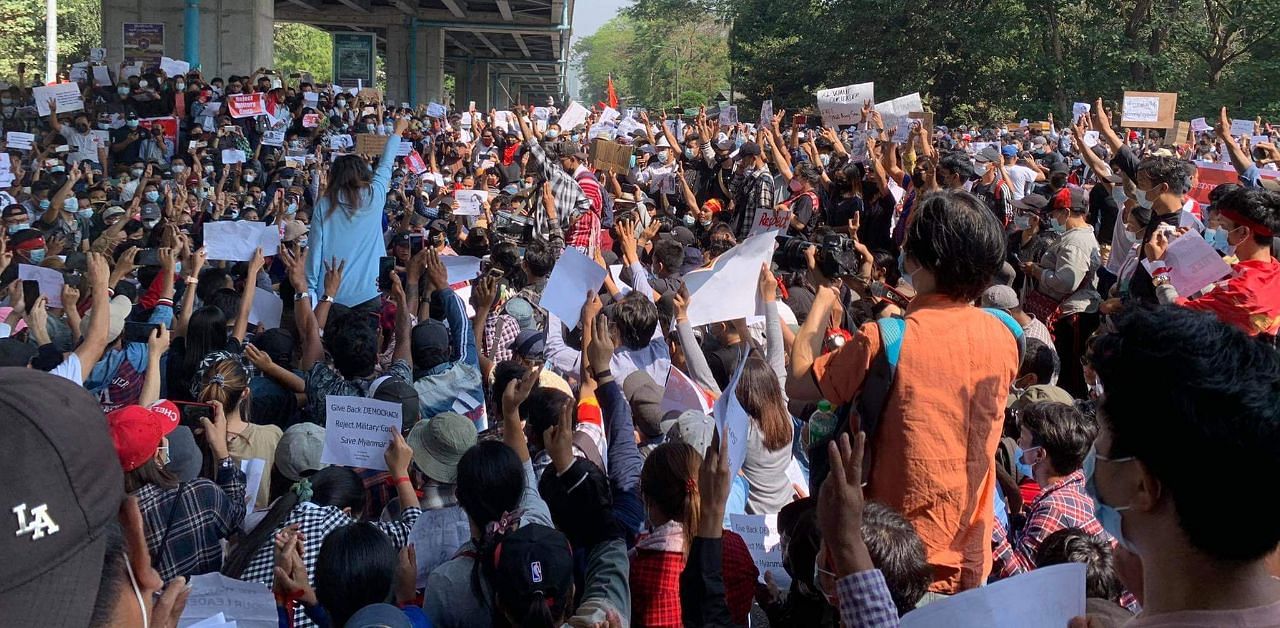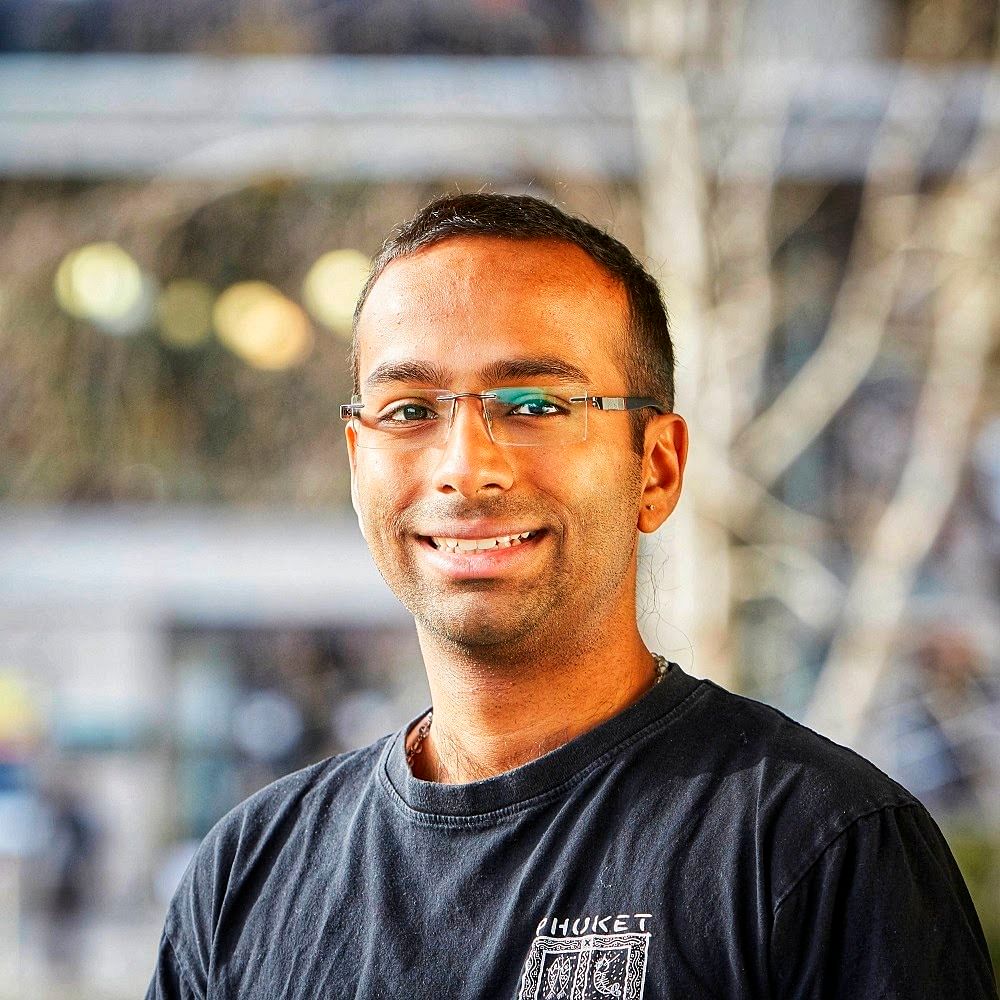
Tens of thousands of protesters thronged the streets of Yangon, Myanmar’s former capital and its largest city, for the third day in a row, decrying the military junta and demanding the release of National League for Democracy (NLD) leader Aung San Suu Kyi.
Early Monday morning, protesters mostly driven by young professionals and students, gathered in large numbers. Sources said that they had not seen people gather in such numbers in years and it reminded them of the pro-democracy 2007 Saffron Revolution. Protests have been growing in size despite an internet shutdown over the weekend that was restored late Sunday afternoon and a continuing ban on social media.
On Nov. 8, 2020, Suu Kyi’s NLD won the Myanmar General Election in a landslide victory, winning a majority in both houses of Parliament. The country’s military, which has staged coups in the past, was quick to claim that was election fraud and threatened to take action.
In a pre-dawn raid on Feb. 1, 2021, the day the new Parliament was set to convene, the military swiftly detained State Counsellor Aung San Suu Kyi, several members of the ruling party and President Win Myint. The control of the nation was handed over to Commander-in-Chief Min Aung Hlaing, who declared a year-long state of emergency. Those detained were charged with various crimes and are still in custody.
The protests, which have been largely peaceful so far, are being organised despite an internet shutdown over the weekend. Internet services were restored late Sunday afternoon. Internet shutdown tracker Netblocks reported that internet connectivity was back to 95% connectivity in the wee hours of Monday. Despite social media platforms such as Facebook and Twitter being restricted, protesters have been able to access social media using VPN services.
“We use Facebook to express our feelings," said a source, an IT professional who did not wish to be named, fearing backlash from the military junta. "Even when the internet was blocked, we used phone calls and SMS to contact friends, organise and get information about protests. Now, the internet is back but Facebook is blocked, so we use VPN to access it.” The source added that the junta issued an order to ISPs to block Facebook citing abuse of the social media platform. However, before the ban on Facebook and internet services, some regime officials leaked information about the blockade and protesters had prepared themselves to resort to alternative means of communication.
When asked about the risk of the increased spread of Covid-19 due to protests, the source said, “Freedom is more important than the spread of Covid-19. Everyone is following protocols, they wear masks, use sanitisers, but maintaining social distance is not possible.”
Several protesters choked the streets of Yangon on motorcycles and cars, honking in protest, a form of demonstration that may reduce the risk of the spread of Covid-19.
Armed police in Yangon were seen guarding public buildings and other installations. The protests have been largely peaceful so far. The protesters even gave police personnel water, flowers and food as symbols of peace. According to sources, the police have a three-layer defence system to maintain peace and security.
Several community leaders and activists issued guidelines to follow during protests including avoiding the NLD party logo, wearing masks, goggles, helmets and lightweight outfits to enable running. Protesters were also advised to carry umbrellas and to wear gas masks to deal with tear gas. Masks are not only for health reasons but also to prevent facial recognition technology from identifying them.
Another form of protest is the drumming of pots and pans every night at 8 pm. "(The banging) is believed to cast out evil spirits. And in this case, our country is now in the hand of evil," said Pyi, founder and principal of pre-schools and elementary schools in the country and a popular personality in Yangon. "Today, I came out of my house alone and called a couple of friends but I found myself in a large crowd. There is no proper leader for the demonstration but everyone came out knowing that we might all be detained or shot."
Other than shutting down the internet to curb protesters, the junta is also spreading disinformation. "The military is believed to be spreading lots of rumours through messages," Pyi said. "Such as them claiming to release prisoners (not political prisoners) so that people might not feel safe to go out and protest."
Protests in Myanmar are not uncommon. Two protests that stand out are the 8/8/88 Uprising and the 2007 Saffron Revolution.
In 1988, after weeks of organising, a nationwide general strike was called on Aug. 8, 1988, a date that was chosen for its numerological significance. Thousands marched on Rangoon’s streets, which was the capital at the time and in other cities across the country. As protests grew, a leader named Aung San Suu Kyi emerged, who was later put under house arrest and won the Nobel Peace Prize. On Sept. 18, the country's government announced a new military ruler who imposed martial law and banned all public protests. The military crackdown began that day and over 3,000 people were killed, over 3,000 were detained and about 10,000 fled the country. Some civil society groups claim that nearly 5,000 died in the uprising.
The 2007 Saffron Revolution began as a response to a steep unexpected and unannounced rise in fuel prices after subsidies were withdrawn. The protest quickly turned against the military government that had by then ruled the nation for five decades. The protest was named after the saffron-coloured robes that several Buddhist monks wore. They led demonstrations in various parts of the nation. A violent military crackdown resulted in the deaths of 13 people with several hundred injured and arrested. The protest would prove to be pivotal in the country’s push for democracy.
"Most of the people of Myanmar are very forgiving by nature and have made peace with the presence of the military in our Parliament," said Pyi. "In their attempt to crack down on the NLD, they (junta) are arresting leaders and political icons and closing down their offices. Besides this, they are detaining businessmen and some government officials who had nothing to do with the party."
Pyi said that military generals made announcements that posting on social media to defy the government was illegal and would be punished. Protesters believe that the protest might be effective to show the world that this is indeed a coup. "These people taking control of our elected government are criminals," she said.
She said, however, that the military would care very little about the movement and many were hoping for international intervention as the military might resort to firing at protesters to crackdown on demonstrations.
Protesters have managed to gain international traction with several nations, including the UK, US and the UN, coming down heavily on the junta and demanding the restoration of democracy. UN Special Rapporteur Tom Andrews tweeted, "Protesters in Myanmar continue to inspire the world as actions spread throughout the country. A general strike has been called for tomorrow. Myanmar is rising up to free all who have been detained and reject military dictatorship once and for all. We are with you."
